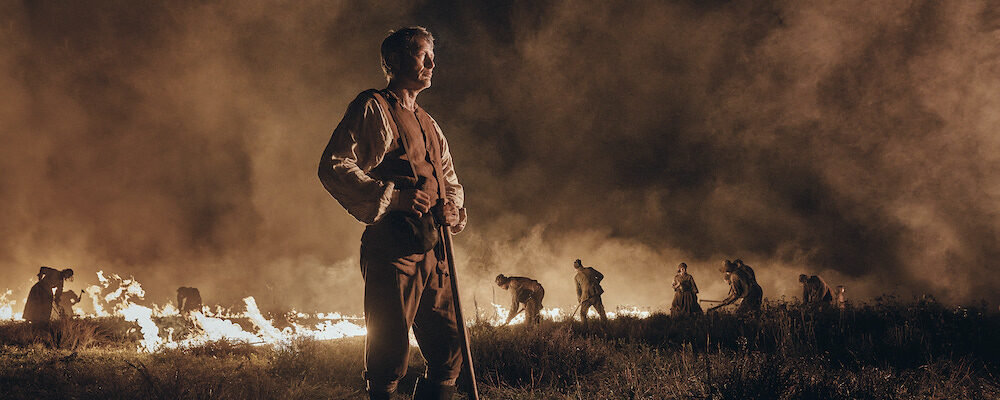‘The Promised Land’: Scorching Historical Epic Pits a Great Mads Mikkelsen Against a Vicious Aristocrat
Alci Rengifo
A film like Nikolaj Arcel’s “The Promised Land” serves as a reminder of what is missing in most historical dramas. Especially in big, expensive productions made in the U.S., there’s little sense of drama or history. Arcel’s latest is a riveting gesture that keeps the audience invested in the characters, while providing an insightful panorama of the times they inhabit. Mads Mikkelsen was born for this kind of role, playing a determined, self-made man facing the wrath of an entrenched aristocracy. He has a face that would have been at home in the classic period epics of bygone Hollywood like “Doctor Zhivago.” To our benefit, he’s back to working with Arcel to prove that you can make sweeping movies that don’t feel the need to be dumbed down.
We’re in Denmark in the 18th century. The French Revolution is still a few decades away and European society is ruled by a strict, merciless feudalism. A former military man, Ludvig von Kahlen (Mikkelsen), is determined to be one of the first to settle the Jutland Heath. It’s a difficult, almost barren stretch of land. Ludvig knows that if he can successfully start a farm, wealth and settlers will follow, as well as recognition from the king. His first laborers turn out to be a couple of runaways, Ann Barbara (Amanda Collin) and Johannes (Morten Hee Andersen), who once worked under the iron fist of a local aristocrat, Frederik De Schinkel (Simon Bennebjerg). Schinkel is enraged when he learns about Ludvig’s plans. The petty tyrant is convinced all this land is rightfully his. When the upright soldier refuses his initial offers to let him cultivate the land as long as he hands over 50% of profits, Schinkel declares war.
Nikolaj Arcel is one of the filmmakers you wish would make more movies often. In 2012 he directed the Oscar-nominated “A Royal Affair,” also starring Mikkelsen and made topics like the Enlightenment the stuff of hot-blooded drama. As always, Hollywood came calling and in 2017 Arcel made the poorly-received Stephen King adaptation, “The Dark Tower.” Now back in Denmark, he returns to the past to make this movie where all of the intensity rests in the high stakes at play. Rasmus Videbæk photographs the movie in the textures of master paintings and the music of Dan Romer is atmosphere, romanticism and suspense. But like “A Royal Affair,” what makes the approach special is that the film never turns into a puffy shirt melodrama. There’s nothing soapy in the content. Arcel conveys ideas through what becomes a brutal standoff. The Heath itself becomes a terrain where two ideals will clash: Ludvig as a representative of the people declaring the right to build a life and Schinkel as the ruthless protector of feudal codes.
“The Promised Land” is not some macho action movie. Every detail and character says something about the world being inhabited, giving microcosmic windows into the times. Ludvig is a pioneer working the land. His great innovation is to plant potatoes from Germany which at the time could signal a major development wherever a crop could flourish. The great challenge is protecting them from frost. Along with Ann Barbara and Johannes, Ludvig also takes in a Romani girl, Anmai Mus (Hagberg Melina), who frightens locals with her darker skin out of a prejudice that the Romani are agents of the devil. She also gives the hard-faced soldier a sense of the joys of domestic life, when he has to care for more than just the prospect of a noble title. This is a candlelit world where settlers ponder if they should kill their only goat for food, while Schinkel dines on fine jellies while having his portrait painted. The feral lord is also eager to marry his cousin, Edel (Kristine Kujath Thorp), who instead has eyes for Ludvig.
It all flows like great literature, not only because Arcel and Anders Thomas Jensen are adapting a 2020 novel by Ida Jessen, “The Captain and Ann Barbara.” Arcel builds layers where we care for Ludvig and everyone else as real people in a complex era approaching momentous changes. When Schinkel kills a peasant by having them doused with boiling water in a steel cage, it’s a wrenching moment that inspires necessary anger. It’s also a perfect expression of why the continent would eventually descend into revolution and war. Tit for tat killings ensue, all over domination of land. Ludvig cannot relent, not out of pure greed, but because he refuses to be a slave to a shallow monster. Class warfare always pits the simple desires of the common citizen with the rapacious gluttony of the elites. Schinkel doesn’t want any more of the plebs coming to the Heath, because then he might not be the only authority in the area. The final crescendo of the story is fantastic and operatic, with blood-soaked knives settling scores, keeping us up to the end wondering how this will all turn out.
A film like “The Promised Land” shames recent, bloated releases like “Napoleon,” where all the money went into the expensive costumes and little attention to the script. And just compare the casting. Mikkelsen is precisely what you need for a role where a person is trying to bend events through sheer force of will. He doesn’t talk much, and when he does, the lines are direct and eloquent with a welcome sincerity. This makes us feel even more for Ludvig when he’s in Schinkel’s grasp, threatening to be broken. The other grand gestures are left to the craft of the film itself. It feels epic because the characters’ wants and passions are so massive, because history is naturally grand if a good storyteller knows how to use it. Arcel’s film is a great entertainment in the best way because it’s gripping and enriching.
“The Promised Land” releases Feb. 2 in select theaters.

